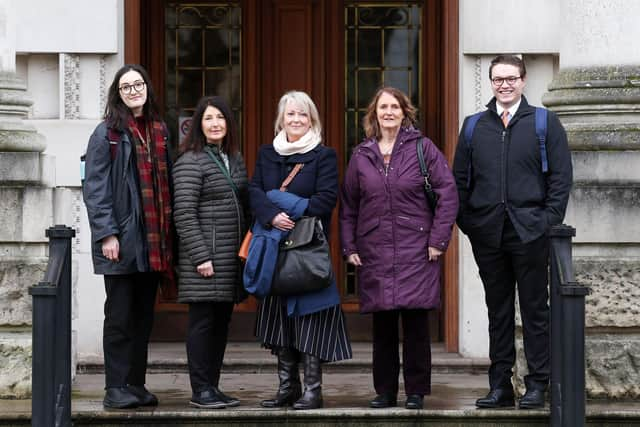Larne Lough gas caverns plan was a matter of political judgement for Edwin Poots rather than legal issue, court is told
and live on Freeview channel 276
Campaigners opposed to the construction of caverns under Larne Lough claim the plans are so significant and controversial that they required referral to the full Stormont Executive.
But counsel for the Department of Agriculture, Environment and Rural Affairs (DAERA) insisted it should not be treated as a “hard-edged question for public law determination”.
Advertisement
Advertisement
Tony McGleenan KC submitted: “The significant and controversial issue is a matter of political judgment.”


In 2021 Mr Poots, then the DAERA Minister, gave consent for the development by Islandmagee Energy Ltd. The plans involve carving seven underground caverns by a method known as solution mining.
Local campaign group No Gas Caverns and Friends of the Earth Northern Ireland are mounting a legal bid to have the marine licence permit quashed. They claim it will keep Northern Ireland locked into fossil fuel dependency for decades beyond a target set to achieve net-zero emissions by 2050.
The excavation process will also allegedly lead to hypersaline salt and chemical solution being discharged into the sea near Islandmagee, creating a “dead zone” threat to marine life.
Advertisement
Advertisement
It was contended that Mr Poots failed to properly consider the environmental implications of a development proposal so significant, strategic, cross-cutting and controversial that he was required to refer it to the Executive Committee before granting permission.
In August last year the judicial review challenge was dismissed at the High Court.
A judge backed the Department’s case that amendments in the Executive Committee (Functions) Act (Northern Ireland) 2020 provided more scope for Mr Poots to give the go-ahead without seeking consent from the wider power-sharing cabinet.
Appealing that ruling, the campaigners argued there was a statutory requirement to comply with the Ministerial Code and refer such a significant and controversial planning decision to the Executive.
Advertisement
Advertisement
But on day two of the hearing, Mr McGleenan contended that it was being wrongly portrayed as a question of law.
“If the appellants’ analysis is right, you strip context and political judgment entirely out of the exercise, and you bring all of these matters to a court as hard-edged questions for public law determination,” he said. “That can’t have been Parliament’s intention.”
Despite opposition from climate change pressure groups, the court was told that a policy on gas storage caverns has been settled at a UK level since 2011.
Mr McGleenan said all environmental grounds of challenge had been abandoned, and claimed “arid legal question” was being used to take the case through the court hierarchy.
Advertisement
Advertisement
He also pointed out that none of Mr Poots cabinet colleagues voiced concerns that the planning decision was significant or controversial.
“You would expect the alarm to be raised by the other Ministers if they identified something that was fundamentally problematic,” the barrister said.
“In this case, every Minister knows about it, every political party knows about it, and no-one raises a hand to say ‘by the way, this should be Executive referral’.”
The appeal continues.